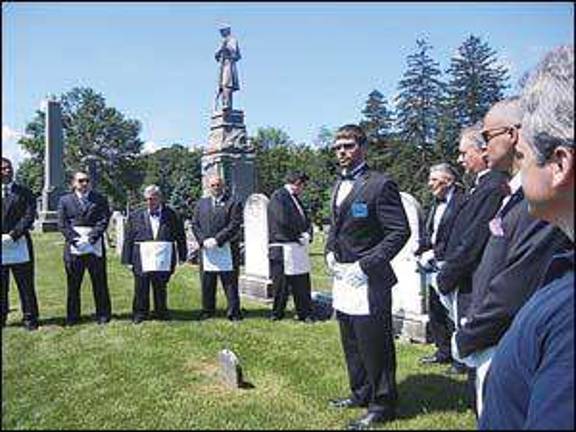Local Masons remember a Civil War veteran

Washingtonville On the anniversary of the death of Capt. Isaac Nicoll, a Civil War veteran who died on July 2, 1863, the Cornerstone Lodge 711, Free and Accepted Masons of Monroe and the Cornerstone Masonic Historical Society conducted a graveside memorial service at Washingtonville Cemetery, his place of burial. Those participating in the ceremony honoring Captain Nicoll were Robert W. Adams, master of Cornerstone Lodge 711 of Monroe; Belding Clearwater, past master and chaplain; Jeff Davidson, past master; Daniel Elliott, representing Hudson River Lodge which combined with the Newburgh Lodge in 1866; David Roman, president of the Masonic Historical Society of Monroe; The Rev. Amy Loving, pastor of First Presbyterian Church of Washingtonville; Linda Burroughs, historian of the Village of Monroe; Linda Standish, historian of the Village of Washingtonville; and Ernest Hegmann representing the 79th NY Regiment of Cameron Highlanders, a Civil War group in New Windsor. Members of Cornerstone Lodge 711 served as the honor guard. Nicoll, who was 23 when he died, was both a member of the 124th New York Infantry (2nd Brigade, 1st Division, 3rd Corps) aka The Orange Blossoms and the Newburgh Masonic Lodge, founded in 1858. The Masonic fraternity honored him at this time, the 150th anniversary of the Civil War. The Newburgh Telegraph, local newspaper at the time, reported Nicoll’s death in 1863 and included this information: “Before his departure for the seat of war, Captain Nicoll was initiated into the Masonic fraternity by the Newburgh Lodge. After the news arrived of his fall at Gettysburg, friends were dispatched on to seek for the body. It was, unlike many thousands of other victims on that field, readily found, from the fact that a board was placed at the head of the grave, bearing his name, the number of his regiment, and a Masonic symbol. “On removing the earth above the body, evergreens were found deposited in the grave. Those engaged in the disinterment knew nothing of the significance connected with this fact, but on their return home, a letter was received from a rebel officer, a Georgian, who stated that a testament was found upon the body of Captain Nicoll, on this fly leaf of which was written his name, some directions in case of his death, and symbol showing his confraternity. “True to the obligations of their brotherhood, though they had met in hostile array on the battlefield , the rebels stopped to give decent rites of sepulchre, and left directions with a resident in the vicinity to have the testament forwarded to friends of the deceased...”